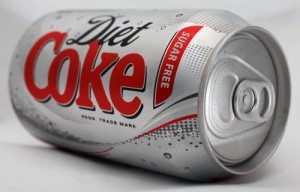(ThyBlackMan.com) You feel better about having those two jumbo sized hot dogs and fries since you ordered it with a diet soda, right? Well, you shouldn’t. While diet soda sounds like an easy way to cut calories, new research shows it may not be any better for you than regular soda.
In fact, it may even be worse. Close to 60 percent of Americans drink diet soda on a regular basis. Many of them believe diet soda helps them with weight loss, but there is mounting evidence that diet soda may actually cause a weight gain.
Diet Soda and Weight Loss: What The Experts Say 
“Recent literature suggests that those who drink diet soda weigh more than those who don’t. That shouldn’t surprise anyone. Does diet soda cause weight gain? I think that is the wrong question. I don’t think people should drink diet soda, whether they have weight problems or not,” says Darwin Deen, MD, senior attending physician at Montefiore Medical Center’s Department of Family and Social Medicine in the Bronx, New York.
Of top concern, drinking diet soda has been linked to developing metabolic syndrome. Metabolic syndrome is a group of conditions that include expanding waist size, increased blood pressure, elevated triglycerides, lower levels of good cholesterol, and high fasting blood sugar levels. Having three or more of these findings increases your risk of diabetes and heart disease. Here are some other research findings you should know about diet soda:
• The More You Drink, The Bigger You’ll Be. According to the San Antonio Heart Study, the more diet sodas you drink, the greater the chance that you will be overweight or obese. For each diet soda you drink there is a
65 percent increase in your risk of becoming overweight.
• The Metabolic Syndrome Link. According to the Framingham Heart Study, as well as the Atherosclerosis Risk in Communities Study sponsored by the National Heart, Lung, and Blood Institute, if you drink diet soda, or consume too much meat or fried foods, you are at risk for weight gain and metabolic syndrome; all three are significantly associated with the disorder.
• Artificial Sweetener Can Lead To Greater Weight Gain. According to research done at Purdue University, rats that were fed artificial sweeteners gained more weight than rats fed normal sugar.
Diet Soda and Weight Loss: Why the Weight Gain?
Although researchers can’t say for sure why diet soda sets the stage for weight gain, there are several possible reasons. “I discourage my patients from drinking diet sodas because while they have no calories, they are created to simulate the sweetness of a regular soda. This leaves the drinker’s taste buds completely overwhelmed. For an example of this, take a sip of water and then bite into your favorite fruit. Then try the same experiment with diet soda. Note that the real food tastes flat after drinking soda,” explains Dr. Deen. The distortion of taste may cause the diet soda drinker to seek higher calorie foods.
Another possibility is that people just eat more because they think they are saving calories from drinking a diet soda. A direct link between artificial sweeteners and a craving for high-calorie foods may exist. There is also the possibility that the link is related to unknown factors involving diet, exercise, or other personal characteristics.
Diet Soda and Weight Loss: Caffeine’s Role
Although diet soda has fewer calories than regular soda, the caffeine content may be greater. According to the Center for Science in the Public Interest, a 12-ounce regular Coke contains 35 milligrams of caffeine and a Diet Coke contains 47 mg. At low levels, caffeine can stimulate energy, make you more alert, and may be beneficial for weight loss. In higher amounts it can cause nervousness, increased heart rate, and difficulty concentrating. You may also get withdrawal symptoms such as headache, irritability, or depression if you stop taking caffeine suddenly.
“Although caffeine can be helpful for weight loss, I recommend getting your caffeine from iced coffee. If you need to add sugar, add as little as possible for taste,” says Deen. “I advise my patients to drink water. For a healthy alternative to diet soda, try adding one-third cup of fruit juice to seltzer water for a low-calorie and not-too-sweet beverage.”
Although the exact relationship of diet soda to weight gain and metabolic syndrome is not clear, it is obvious that diet soda should not be considered a “healthy” alternative to regular soda. When you choose to drink any soda, you are choosing to drink a beverage that is just not as healthy for you as milk, juice, or water.
Written By Sydney James

















They use artificial sweeteners. Artificial anything can’t be good can it?